2019-20 CityLab High School Initiatives
9th Grade Trinity River Project
During the Fall 2019 semester, the 9th grade students at CityLab participated in a multidisciplinary grade level investigation that focused on the Trinity River. This project was designed to support to the 9th grade theme of the “Natural and the Manmade”, and included river related discussions and PBL projects in a number of CityLab classes including Biology, English, AP Human Geography, and Principles of Architecture.
The students investigated the Trinity River through multiple lenses and had the opportunity to hear from Trinity River experts and organizations. During the project, students explored the relationship of the city to the river; and learned about the history of the river and the Trinity River Basin, in addition to discussing land use and environmental issues relating to the river.
To prepare for the project, CityLab HS hosted a series of three “Trinity Talks” presented by the Trinity Park Conservancy. The talks began with a presentation by Brent Brown the President and CEO of the Trinity Park Conservancy, who spoke to the students about the vision for the river and Harold Simmons Park.
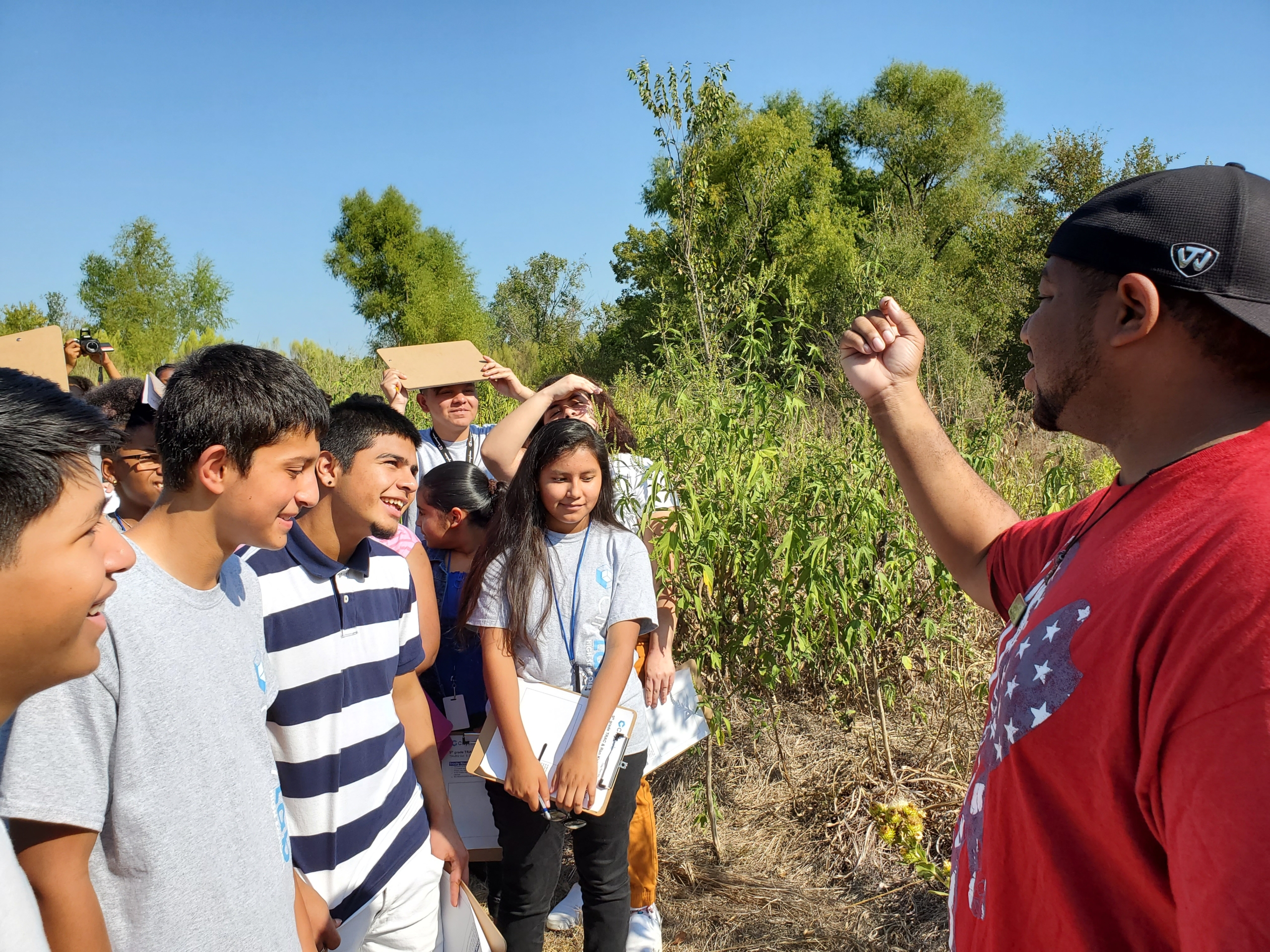
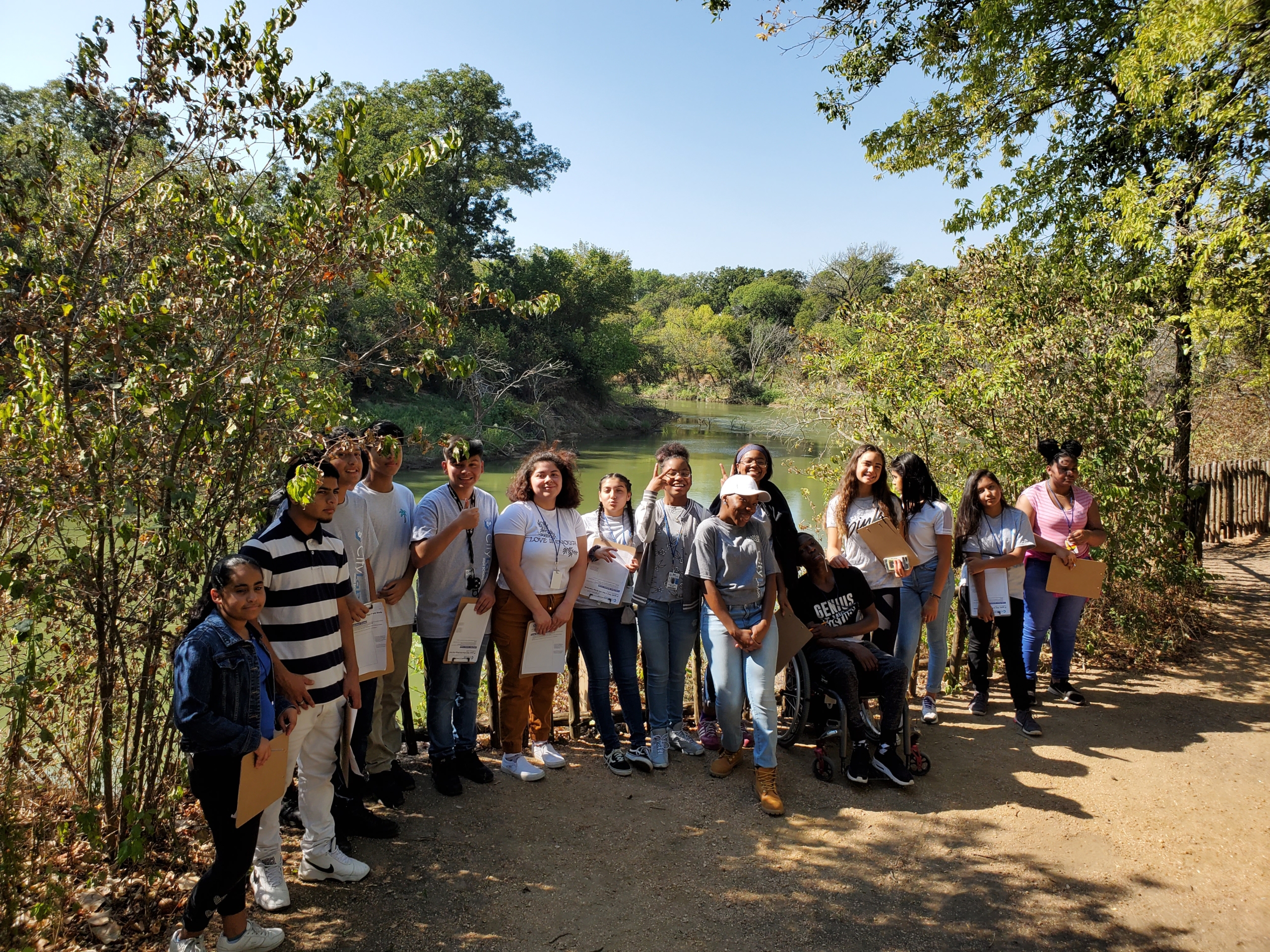
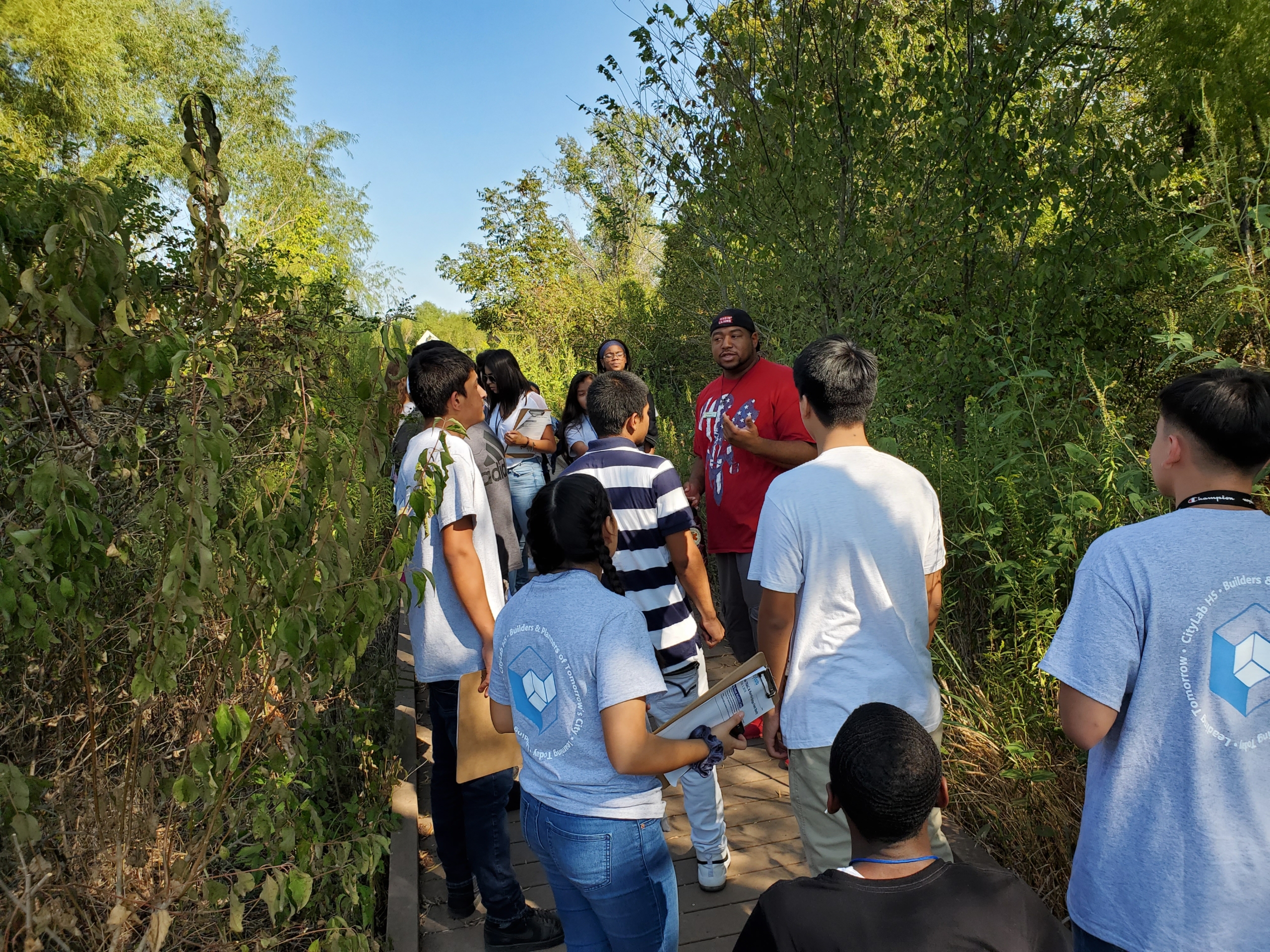
Mid-way through the project, the CityLab 9th graders had the opportunity to visit the Trinity River Audubon Center (TRAC) and the Ronald Kirk Pedestrian Bridge and experience the river first-hand. The Field Study to TRAC included tours of the first LEED certified project by the Dallas Park and Recreation Department, and guided hikes with TRAC staff to the Trinity River overlook. At TRAC, students observed local flora and fauna, as well as LEED design features of the building including a vegetated roof, rainwater collection system, and recycled materials. The students then visited the Ron Kirk Bridge to further explore the relationship of the Trinity River and downtown Dallas.
TxA 80th Annual Conference & Design Expo
Galveston, TX: October 24 - October 25, 2019
The 80th Annual Conference and Design Expo, themed “Immersion” took place at the Moody Gardens Convention Center in Galveston, TX. The conference, sponsored by the Texas Society of Architects, featured speakers, panel discussions, the largest architectural products showcase in the Southwest, and events for architects at all stages of their career.
Ten students and the CityLab Principal and Cofounders were invited to the TxA Conference to introduce the school and its curriculum and to discuss community-based projects the students have undertaken at CityLab HS during its first 2 years. At the conference, the CityLab students were able to interact with architects and design professionals from across the state, and explore Galveston and the Rice University campus.
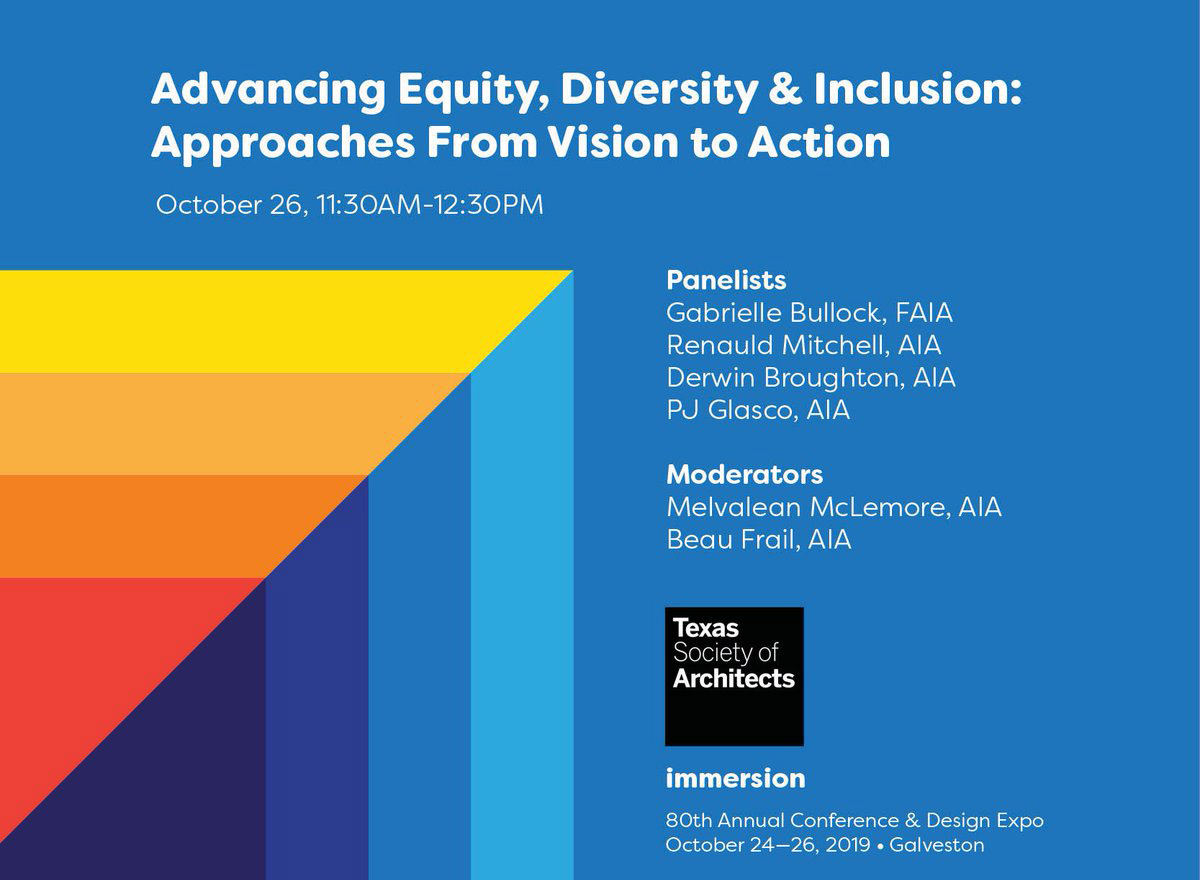
Using the City as a Classroom Panel Discussion
Moody Gardens Convention Center. Galveston, TX - October 25, 2019
Panel Discussion Overview: CityLab High School, a community initiative led by educators and design industry experts, is the first of its kind public school with a design focus in downtown Dallas. At CityLab HS, students engage with the city as a laboratory for learning as they develop critical thinking and creative problem-solving skills via hands-on, real-world projects. At CityLab, students work in collaboration with organizations such as the AIA, and design professionals to become engaged and informed citizens prepared for college and future careers.
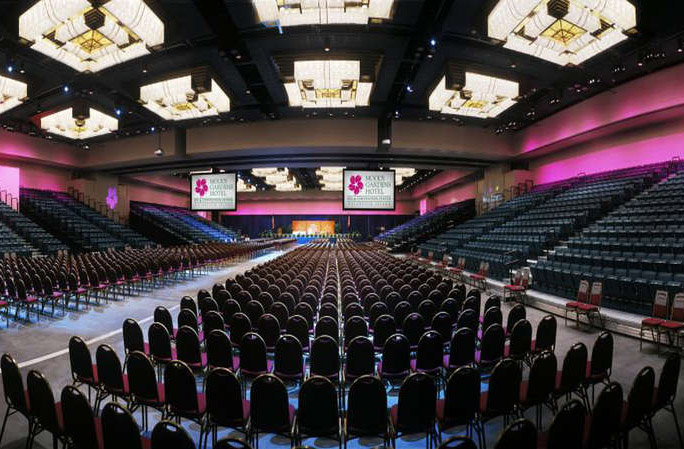
Speakers: Peter Goldstein, AIA, Lorena Toffer, AIA, CityLab Principal Lynn Smith, CityLab HS students

APA Texas (American Planning Association) Planning Conference
November 7, 2019, Waco Convention Center
CityLab HS was recognized with an APA TX Chapter Award at the APA-Texas Chapter Annual Planning Conference in Waco, Texas on November 7th. The APA Texas Planning Awards Program recognizes individuals, organizations and communities for outstanding contributions to planning in Texas. The Texas Chapter Award is given to a person, group or organization outside of the planning profession that has made an impact on the profession or their community. The Executive Committee of the Texas Chapter is made up of members from across Texas, and they gave the award to CityLab for their efforts to develop a public school in the core of the city that includes a planning curriculum. The APA Texas Chapter is also excited to build a partnership with CityLab HS following the role of the American Planning Association in bringing Mitchell Silver, the Commissioner of the New York City Parks Department, to CityLab HS as the keynote speaker at the 2019 CityLab Summit.
Thirteen CityLab students attended the APA Planning Conference in Waco, and presented their work at the school to industry experts. In addition, the CityLab students had the opportunity to meet with planners and design professionals from around the state including artist and Keynote Speaker Candy Chang.
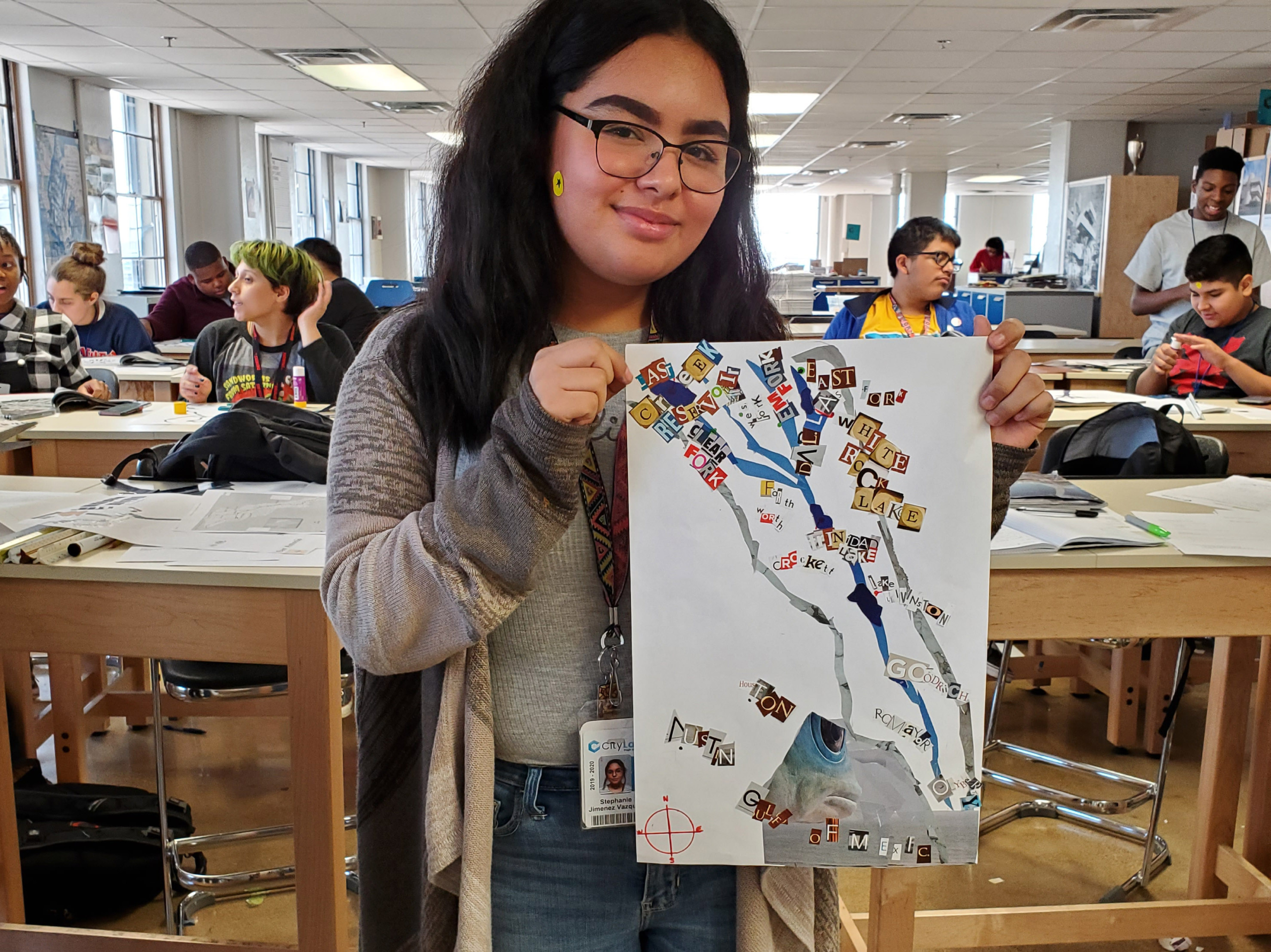
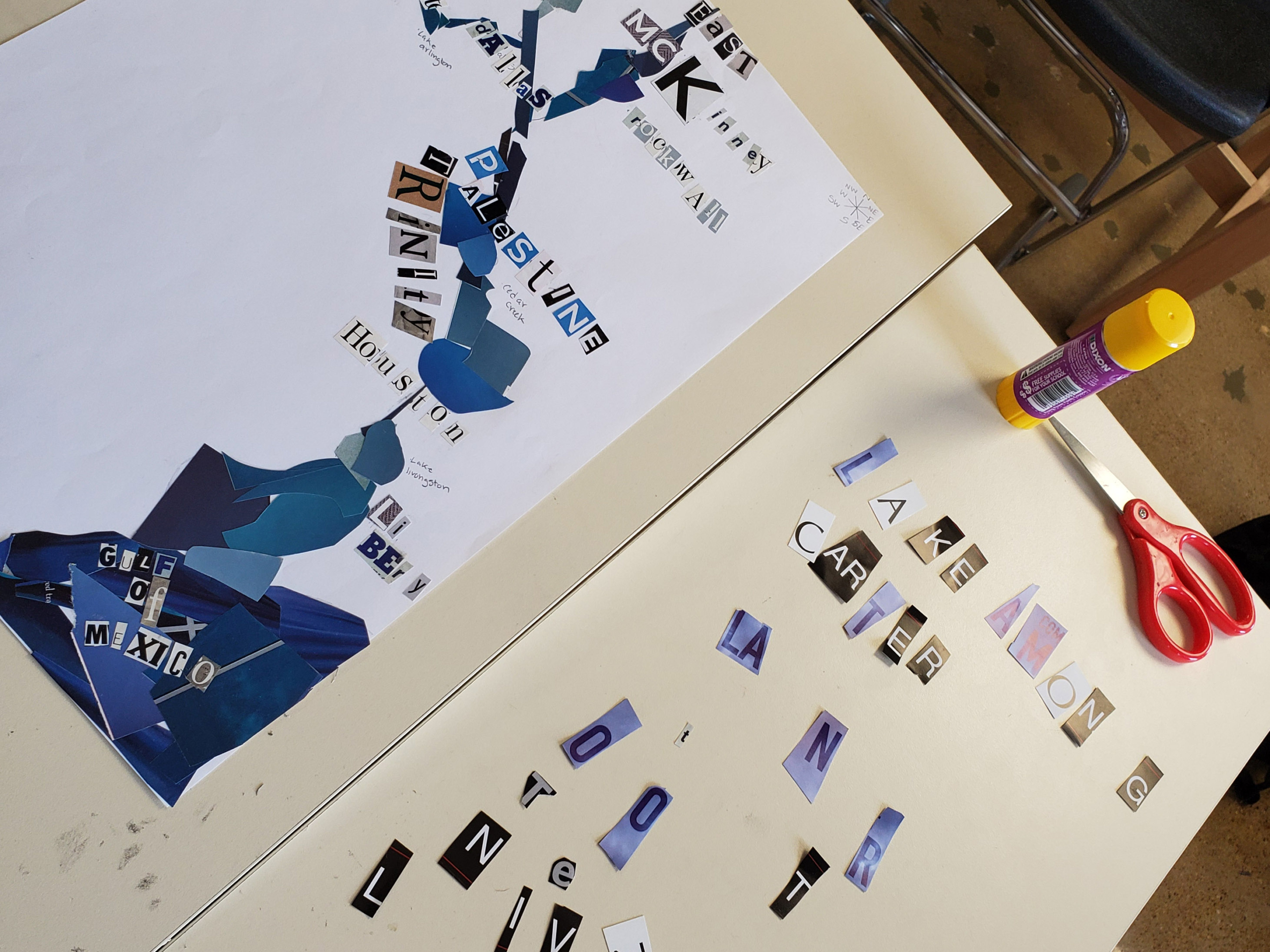
River of Ideas: The Natural World as Viewed by CityLab Students
9th – 11th Grade Reading PBL Project M. Boyd, Fall 2019
Driving Question: How can you contribute to an anthology that allows you to follow your creativity to its fullest extent as you explore your environment, place and local watershed.
Performance Task: This project is dedicated to environmental literacy and seeks to inspire youth to explore their environment and watersheds.
Using the elements of poetry, writing, art, and design, the students used a standard sheet of white paper as their creative space to share their thoughts about their environment and/or watershed. Students explored their ideas in a variety of media including pencil drawings, collages, and digital images and writing was open to interpretation: poetry, news articles, short stories and creative writings. At the conclusion of the project, students submitted their work to create a professionally published book to industry experts at the Fall Exhibition Day on Dec. 16, 2019.
Industry/Community Partners: Dallas Public Library, Guest speaker- Ann Marie Newman, poet

Design for the Blind
11th Grade, Principles of Architecture II PBL Project R. Hardaway, Fall 2019
Driving Question: How do we design a mixed used spaced to accommodate vision impaired/ blind people?
Performance Task: The CityLab 11th graders will explore the impact of making all buildings accessible. Students will develop a design through the five Design Phases creating a bubble diagram, massing model, site analysis, diverse usage map, street scape design, floor plan and elevations. Through this project students will be assessed on their ability to proposed creative design solutions and their technical drawing skills. Using Design Thinking strategies, the students in Principles of Architecture II class will be given the opportunity to work independently as well as collaboratively to come up well thought out designs.
Field Study: City Hall – included all CityLab 11th graders serving at the White Cane Dallas to get a feel how people with vision impairment navigate our city.
Industry/Community Partners: Guest Speaker – Blake Lindsey, Dallas Lighthouse for the Blind, White Cane Day – Celebration of the blind
Pattern Design Architecture
10th Grade Principles of Architecture I PBL Project R. Hardaway, Fall 2019
Driving Question: What word best describes you? Can you design a 2D pattern the evokes that word? Can you design a 3D space that conjures that word in space?
Performance Task: The CityLab 10th graders explore the pattern design both symmetrically as well as asymmetrically based on understand the meaning of words. Pattern records the design decisions taken by many builders in many places and describes a problem in terms of so-called forces and the solutions is said to resolve those forces. Patterns balance remaining forces. Students define and marinate on the meaning of the word that best describes them and use pattern to capture architectural design ideas in an abstract form as well as a technical drawing of a space. Students are assessed on their ability to proposed creative design solutions and their technical drawing skills. Using Design Thinking strategies, students will be given the opportunity to work independently to come up well thought out designs.

Industry/Community Partners: Project Reviews from other students
Organic Fruit & Vegetable Gardening in the City
10th and 11th Grade Energy and Natural Resource Technology PBL Project Abisoye Igenoza, Fall 2019
Driving Question: How can families living in the cities have unlimited access to fresh, nutritious, organic fruits and vegetables?
Performance Task: 10th and 11thgrade students in the Energy and Natural Resource Technology classes are managing 10 garden beds at the Encore Park Community Garden. The First Presbyterian Church of Dallas owns the Encore Park Community Garden and leased ten garden beds for carrying out student projects to City Lab High School at no cost. At the start of the project, students visited the garden to clear garden beds, mulch, water, and transplant vegetable seedlings. Students also completed garden log as a form of documentation for their projects. Subsequently, students will visit the garden every two weeks to observe the growth of the vegetables, weed, water and harvest, when needed. Students will donate part of the produce to Stew Pot to feed the homeless and sell the rest at the Farmers’ Market.
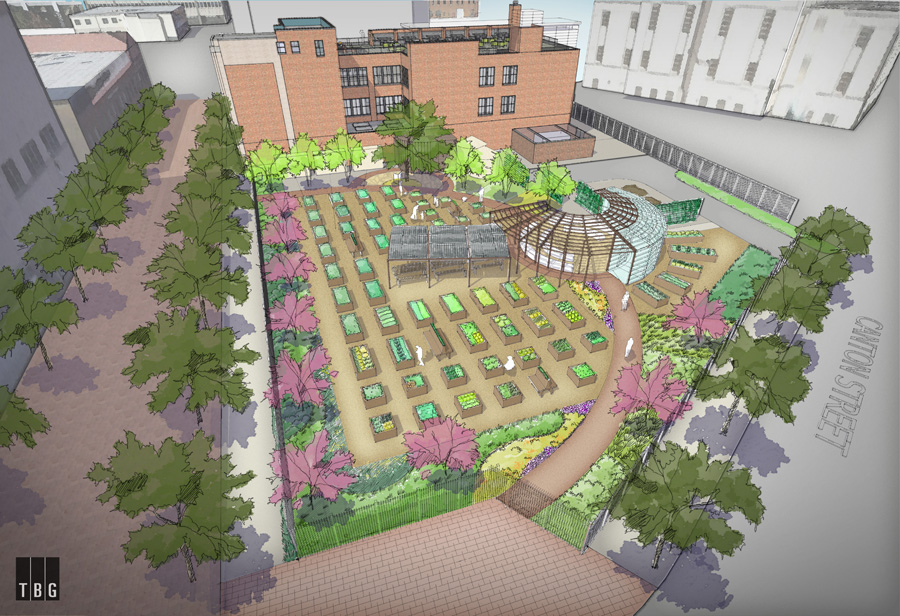
Industry/Community Partners: The First Presbyterian Church of Dallas, The MLK Seedling Garden
Homage to a Tree
Class: Principles of Architecture, Grade Level: 9th, Teacher: P. Goldstein
Driving Question: Can you create an homage to a native Texas plant or tree that will inform visitors to the new Trinity River Park about the characteristics and beauty of the natural world?
Project Summary: The CityLab 9th graders will explore the history and geography of the Trinity River and create an infographic for Harold Simmons Park based on a native Texas tree or plant found in the Trinity River Basin. Students will use native plant species as the starting point for a design investigation based on the physical characteristics of the plant/tree they select. Using Design Thinking strategies, the students in Principles of Architecture class will then transform the plant into a design of their own that will be incorporated into their infographic. Students will explore their ideas in a variety of media including pencil drawings, collages, and digital images.

Industry/Community Partners: Trinity River Audubon Center and the Trinity Park Conservancy
Guest speakers: Brent Brown, Marcus Shropshire, John Devine- Trinity Park Conservancy. Studio Outside- landscape architects.
![View of the Trinity River floodway looking southeast with the Margaret McDermott Bridge and the Trinity Skyline Trail along the Trinity River. . [ Photo: Courtesy of The Trinity Trust Foundation/Produced by Michael Van Valkenburgh Associates ]](https://citylabhsfoundation.org/wp-content/uploads/2020/07/Trinity-River-1.jpg)
Dallas and the Trinity: Studying the Relationship Between the City and the River
Class: English I, Grade Level: 9th, Teacher: L. Dowdy
Driving Question: What is the relationship between Dallas and the Trinity River?
Project Summary: Students will research a specific aspect of the Trinity River (i.e. history, flood control, pollution, surrounding neighborhoods), use their research to create an expository text, then edit that text and design an infographic that through language and visuals conveys that information. They will work through drafts to revise and refine their infographics; they will present their finished work to industry experts at the Fall Exhibition Day on Dec. 16, 2019.
Field Studies: The CityLab Field Study to the Trinity River Audubon Center (TRAC) and the Ron Kirk Bridge on TH Oct. 3rd included all CityLab 9th graders working on the multidisciplinary grade level PBL Trinity River Project.
Industry/Community Partners: Trinity River Audubon Center and the Trinity Park Conservancy
Guest speakers: Brent Brown, Marcus Shropshire, John Devine- Trinity Park Conservancy. Studio Outside- landscape architects.
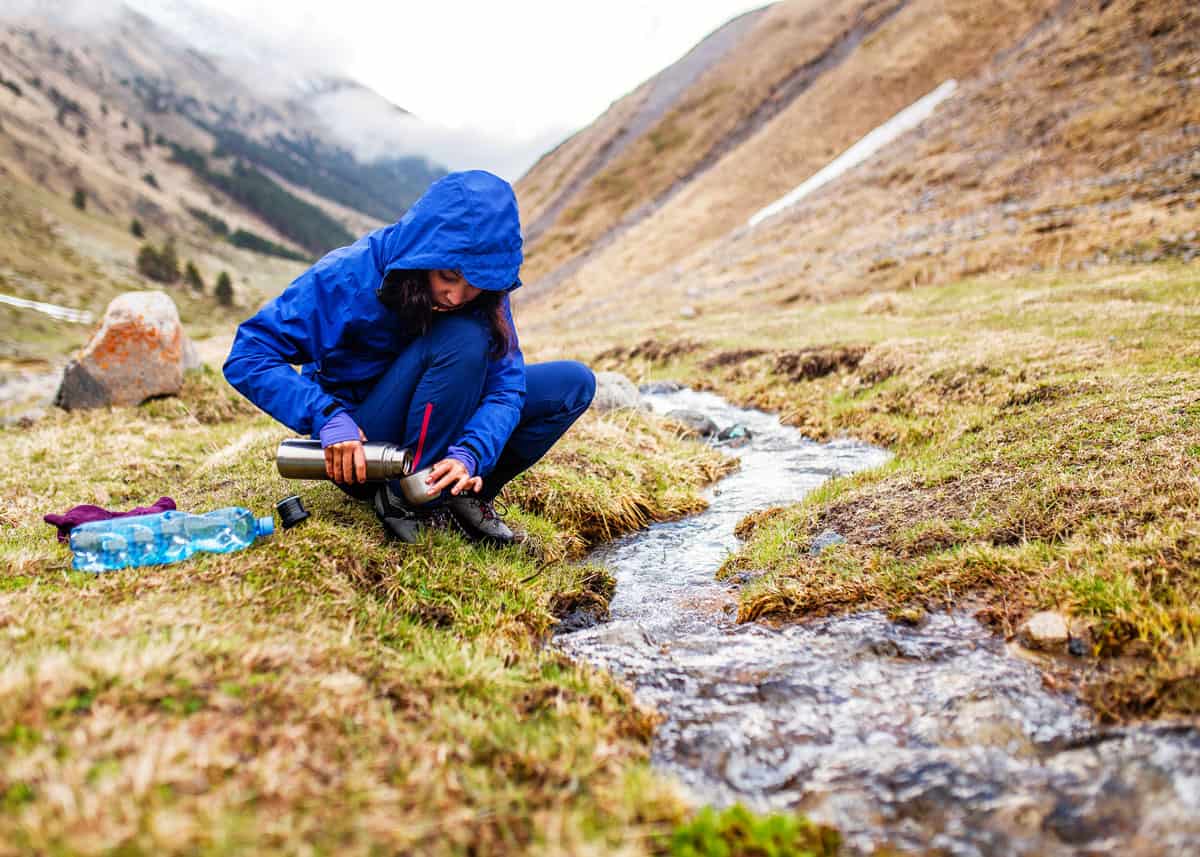
Drinkable Trinity River Water
Class: Chemistry, Grade Level: 10th, Teacher: B. Toomer
Driving Question: How can we make a sample of Trinity River water drinkable without the use of an established water treatment system?
Project Summary: Students are tasked to create a way to clean a sample of water from the Trinity River without an established water treatment system. The sample of water must be able to be consumed, in theory, based on their cleaning technique. As an extension, students will determine what the appropriate pH for the water sample must be to be consumed, bathed/showered in, and cooked with. Students will first research what are some known ways to clean “natural” water and, in a group of three, will create their own way to do so. Students will test their hypothesis by utilizing the items needed for their particular design. Next, students will test the pH and water quality of their samples after they’ve cleaned them. Due to prior research, students will understand what the appropriate pH and other water quality tests are for their water samples to pass the “consumption test”.
Industry/Community Partners: El Centro Community College and Mountain View Community College
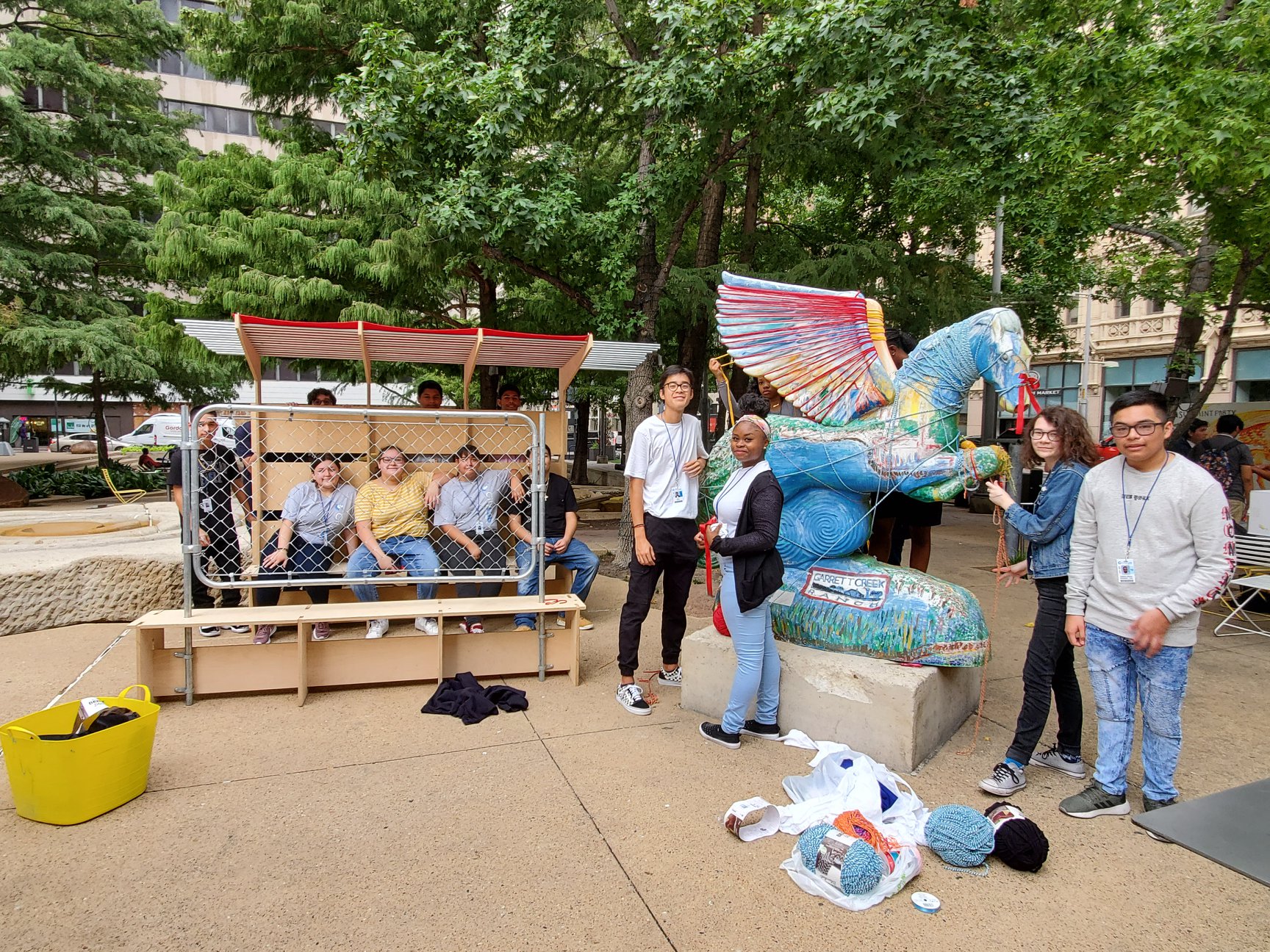
Pegasus Plaza
Class: Architectural Design I, Grade Level: 10th, Teacher: P. Goldstein
Driving Question: Can you create a temporary installation that incorporates local and historical traditions in an urban space in downtown Dallas?
Project Summary: Students will investigate and work on a series of projects relating to Pegasus Plaza, an urban space in downtown Dallas designed by artist Brad Goldberg. On PARK(ing) Day Dallas, the CityLab 10th graders will create an installation in Pegasus Plaza that includes the FD19 CityLab Bus Stop and a re-imagined Pegasus sculpture that was donated to CityLab HS. During this portion of the project, students will study local history and the iconic flying red horse from Greek mythology that is associated with the City of Dallas. After PARK(ing) Day, the students will redesign the Pegasus Plaza brochure, and then create a design+build installation for Pegasus Plaza in collaboration with industry partners bcWORKSHOP and Downtown Dallas, Inc. CityLab students will participate in a series of design charrettes and work with artists and industry experts on this project funded by a grant from the National Endowment for the Arts
Industry/Community Partners: bcWORKSHOP, Downtown Dallas, Inc. (DDI)
Guest speakers: Dr. Gail Thomas, Founding Fellow of the Dallas Institute and the creator of the Center for the City.
Seeing Myself in History
Class: US History, Grade Level: 11th, Teacher: J. Sayed
Driving Question: How can photography be used to document events in history that continue to impact our own lives?
Project Summary: Students will identify the events and ideas they most closely identify with during the time period 1877-1939 and select photographs to represent the people and events that have most shaped their present day lives with the objective of creating a photography exhibit that reflects the impact of historical events on their lives as a whole. Each chosen photograph will be accompanied by a personal narrative describing the student’s connection with the subject.
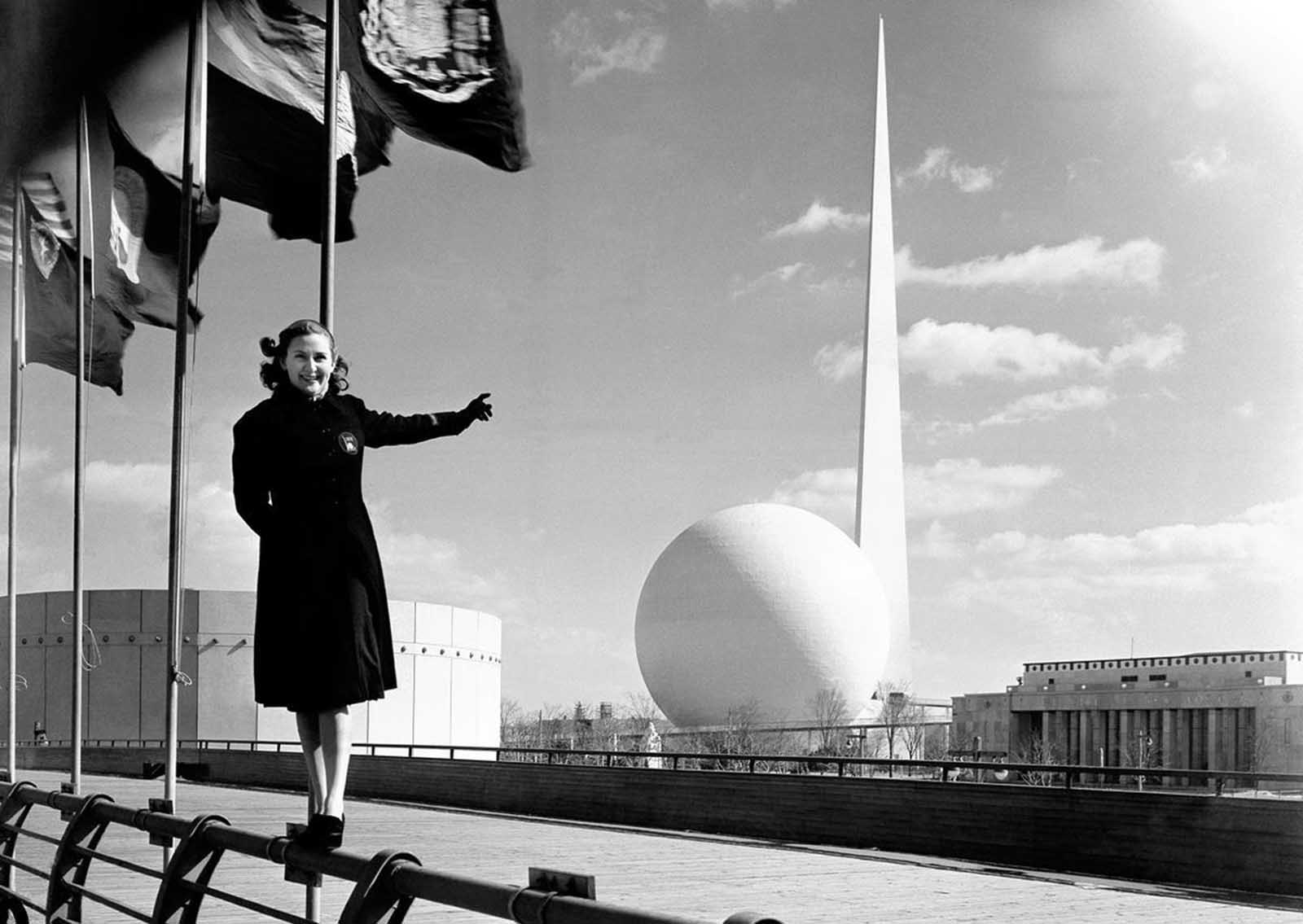
Migration Stories Board Game
Class: AP Human Geography, Grade Level: 9th, Teacher: D. Good
Driving Question: How can CityLab students use a board game to teach people about the challenges faced by migrants and refugees?
Project Summary: Students will explore the history and geography of human migration as part of the second unit of study: Population and Migration. Students will participate in specially designed learning experiences in order to develop an understanding of the experiences that migrants and refugees face during their journeys. Students will then work in teams to ideate, plan, design, and build a board game with the purpose of educating players about the experiences of a migrant.

The Struggle: Looking at Issues of Equity & Justice in Dallas
Class: English II, Grade Level: 11th, Teacher: L. Dowdy
Driving Question: How can we tell the story of the struggle for equity and justice in Dallas?
Project Summary: Students will research a specific incident or issue on the topic of social justice in Dallas (i.e. racial violence, LGBTQ rights, access to healthcare, food deserts, environmental justice), use their research to create an expository text, then edit that text and design an infographic that through language and visuals conveys that information. They will work through drafts to revise and refine their infographics; they will present their finished work to industry experts at the Fall Exhibition Day on Dec. 16, 2019.
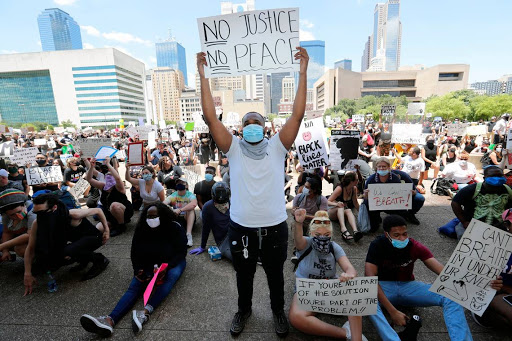

Genetically Modified Fruit Flies
Class: Biology, Grade Level: 9th, Teacher: B. Toomer
Driving Question: How can we genetically modify these types of flies to lower their activity in eating the fruits we love daily?
Project Summary: For the past 20 years, farmers have battled with insects that consume their crops on a regular basis. They’ve tried several ideas to lower, if not eliminate, this type of insect activity. Some of the most common insects are fruit flies, commonly called Drosophila melanogaster flies. Students will be working with the Drosophila melanogaster flies of three types: vestigial (fruit flies with no-wing mutation), dumpy (fruit flies with small-body mutation), and wild-type (fruit flies with no known mutations; otherwise known as “normal” fruit flies).
Industry/Community Partners: Professors from El Centro Community College and Mountain View Community Colleges will come speak to students about the progression of GMOs and GMFs in today’s society, especially as it relates to their food and produce. Students will gain a deeper understanding of the importance of insect control as it relates to crops and how it directly affects them in various ways.

Making My Mark
Class: Algebra I, Grade Level: 9th, Teacher: M. Nunley
Driving Question: What mark represents your identity?
Project Summary: In “Making My Mark,” students will be investigating how to express some of their identity by creating a personal logo and writing a personal narrative. They will create their own logo by graphing several blueprint drafts to demonstrate their knowledge of linear functions, domain, and range. Through this project, students will be assessed on their proficiency with the mathematical concepts of graphing linear equations, writing equations of line, and domain and range of line segments. In addition, they will be assessed on how they understand the math, and how far they are willing to push their learning through the complexity of their logo design. Finally, this project also gives students the opportunity to learn about each other as individuals so that they can relate and make connections.
Guest speakers: Nina Payan- Digital Marketing Manager, Draeger Design Center
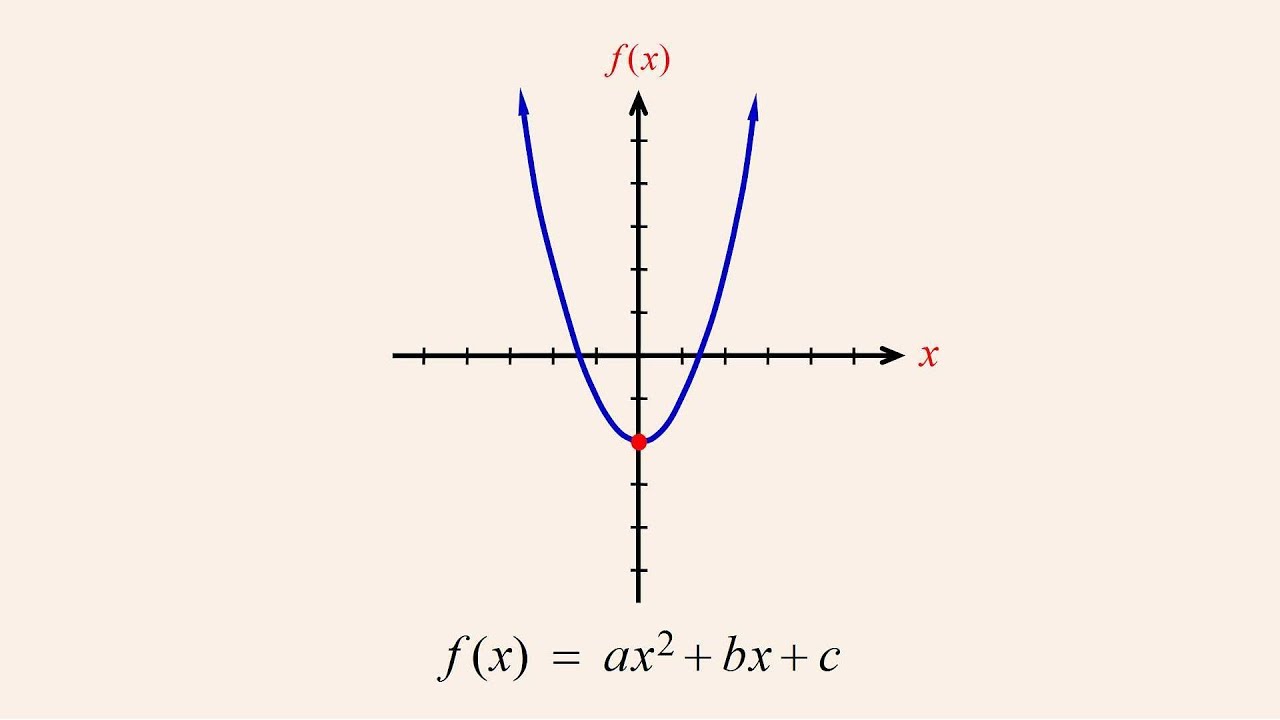
Launching into Quadratics
Class: Algebra II, Grade Level: 10th and 11th, Teacher: L. Avera
Driving Question: How can quadratic functions be used to model real-life launching patterns?
Project Summary: In “Launching into Quadratics” students will be investigating projectile motion and quadratic modeling by building a catapult, collecting data on launch distance and height, using this data to write a quadratic equation and competing in a target competition to see which group’s equation was most accurate. Through this project, students will be assessed on their understanding of key attributes of a quadratic and using real world data to create a quadratic model. Additionally, students have the opportunity to work in groups and make design decisions when building their catapult.
CityLab Organizational Chart
Class: Entrepreneurship, Grade Level: 10th and 11th, Teacher: A. Igenoza
Driving Question: What is the most appropriate organizational chart for CityLab High School?
Project Summary: Having studied the different types of organizational charts and identified the employees working at CityLab High School, students will design an organizational chart that illustrates the various departments, personnel and leadership structure at CityLab High school. The administrators will be invited to assess and choose the chart that best illustrates CityLab High School. With the permission of the administrators, we plan to upload the chosen organizational chart on the school website, or print and hang it in strategic locations in the building.

Project Based Learning Fall Showcase
December 16, 2019
After a semester of students working on individual projects and group projects, the students got to present their projects in a public showcase. There were over 37 projects presented by 211 students and over 32 community members who juried the projects. The students enjoyed the experience and learned about the subject they were presenting and brushed up on presentation skills.
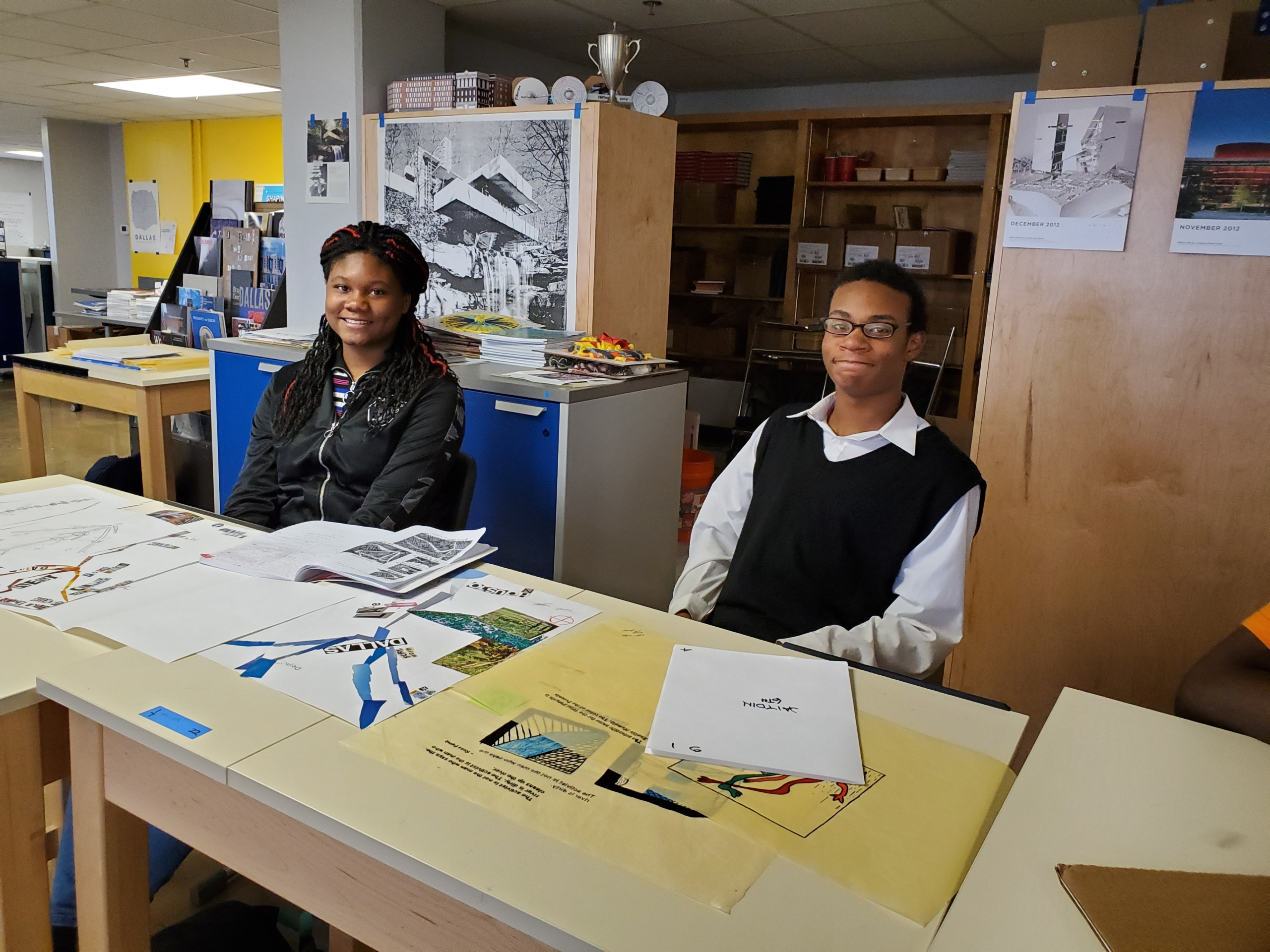
The Further We Roll, The More We Gain
Class: Principles of Architecture, Grade Level: 9th, Teacher: P. Goldstein
Driving Question: How do you design a flag that honors a significant American woman and/or the 100th Anniversary of the 19th Amendment that gave women the right to vote?
Project Summary: Make Art with Purpose (MAP) is commemorating the 100th anniversary of the Nineteenth Amendment to the United States Constitution with MAP2020: The Further We Roll, The More We Gain, an arts festival at locations throughout Dallas Fort Worth (DFW). A core component of MAP 2020 is the commissioning of local and national female artists to design flags, to be installed throughout DFW that honors a woman who has had an impact upon their lives and/or broader culture and society, or explores themes connected to the 19th Amendment.
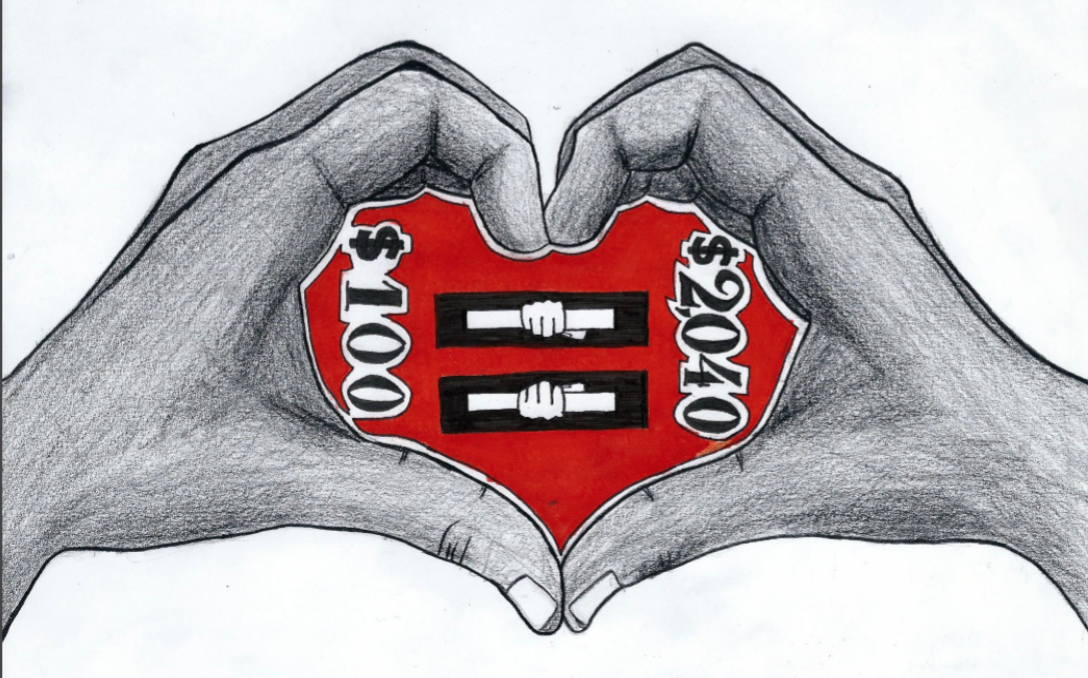
Industry/Community Partners: Janeil Engelstad, Make Art with Purpose (MAP)

Library Placemaking
Class: Architectural Design I, Grade Level: 10th, Teacher: R. Hardaway
Driving Question: How can you incorporate placemaking principles to design spaces in a public library that foster “community”?
Project Summary: Placemaking is a multi-faceted approach to the planning, design and the management of public spaces. Placemaking capitalizes on a local community’s assets, inspiration and potential, with the intention of creating public spaces that promote health, happiness and well-being. For this 10th grade PBL Project, students were to incorporate placemaking principles in the design of (10) essential places in a public library that foster community.

Adaptive/Reuse Project
Class: Architectural Design II, Grade Level: 11th, Teacher: R. Hardaway
Driving Question: How might an existing gas station structure be adapted and re-purposed for a new use?
Project Summary: This project focused on how existing gas station businesses might adapt to a changing future. The electric car revolution is coming as people around the world choose to drive electric vehicles instead of gasoline powered cars. The question then becomes, what will happen to all of the gas stations? There are over 130,000 gas stations in the US alone, and many are family-run small businesses. Based on an existing structure, students are to propose a program for and redesign an existing gas station.
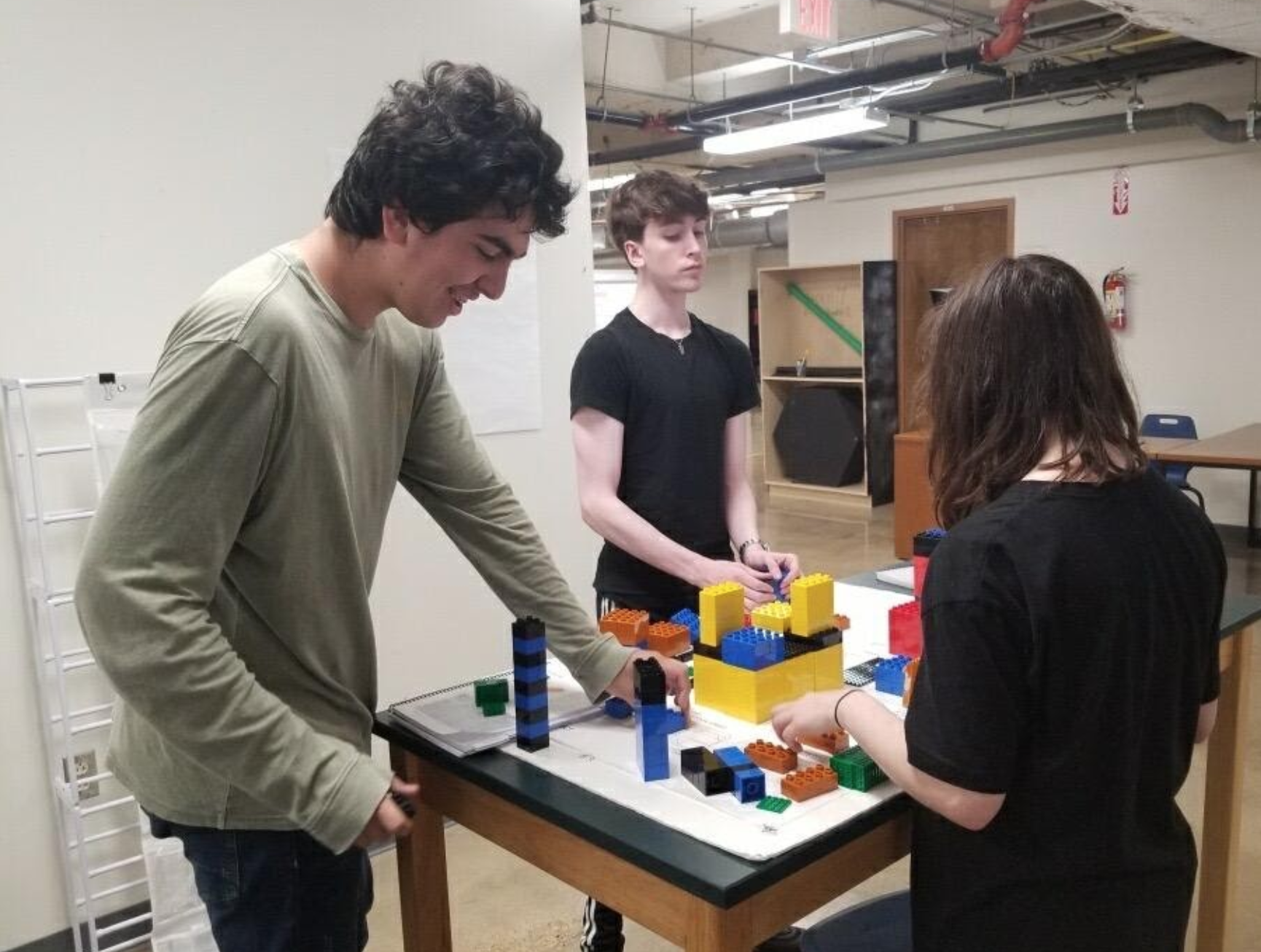
UrbanPlan
Class: Urban Planning Pathway, Grade Level: 10th and 11th, Teacher: J. Sayed
Driving Question: How do you redevelop an urban site that meets market demands and responds to the local context?
Project Summary:
In the spring of 2020, CityLab student development teams collaborated on an Urban Planning PBL Project developed by the ULI Urban Land Institute that responds to a request for proposals (RFP) to redevelop a five-and-a-half-block site in the mythical city of Yorktown. Through the process, students discovered one of the dynamic fundamental challenges of development: how the forces of our market economy clash and collaborate with the forces of a representative democracy to create the built environment. The UrbanPlan Project format allowed students to form development teams to respond to the RFP for the redevelopment of a specific, blighted neighborhood named Elmwood with the goal of winning the contract from the city.
Industry/Community Partners: ULI Urban Land Institute North Texas, and the City of Dallas Planning and Urban Design Dept.
Generating Electric Energy using Alternative Sources of Power: Soil Project
Class: CityLab Environmental Science Pathway, Grade Level: 10th and 11th, Teacher: A. Igenoza
Project Summary: During the Spring of 2020, the students in the Environmental Science Pathway at CityLab continued their work on the Community Garden at Encore Park growing cauliflower, broccoli, and lettuce. In addition, the students worked on a Renewable Energy PBL Project where they powered LCD bulbs using solar power, and a Soil Project where students identified the components of soil profiles, and determined the permeability of different types of soil.

Triad Mentorship Program
Description: The triad mentoring program consists of triads of a university student, industry expert and a CityLab High School student. Interactions are centered on our main instructional focus of Project-Based Learning within the scope of our career pathways. Industry experts serve as mentors for students by sharing insights and providing guidance about the workplace, careers, and education. University students serve as mentors for students by sharing insights and providing guidance about preparing for post-secondary education.
Events: The last event for the Triad Mentoring Program was held May 7th via Zoom. Over the duration of the program we had 19 students participate, 12 UTA students and 10 industry experts from all three of our school pathways.
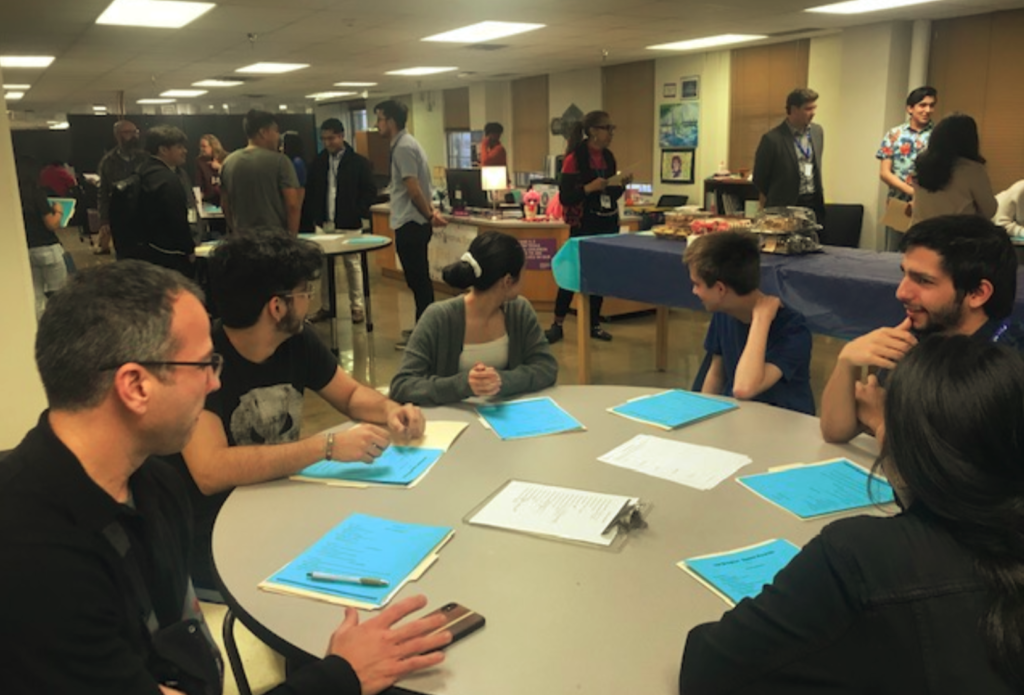
Partners: The CLHS Foundation Board and UTA CAPPA

